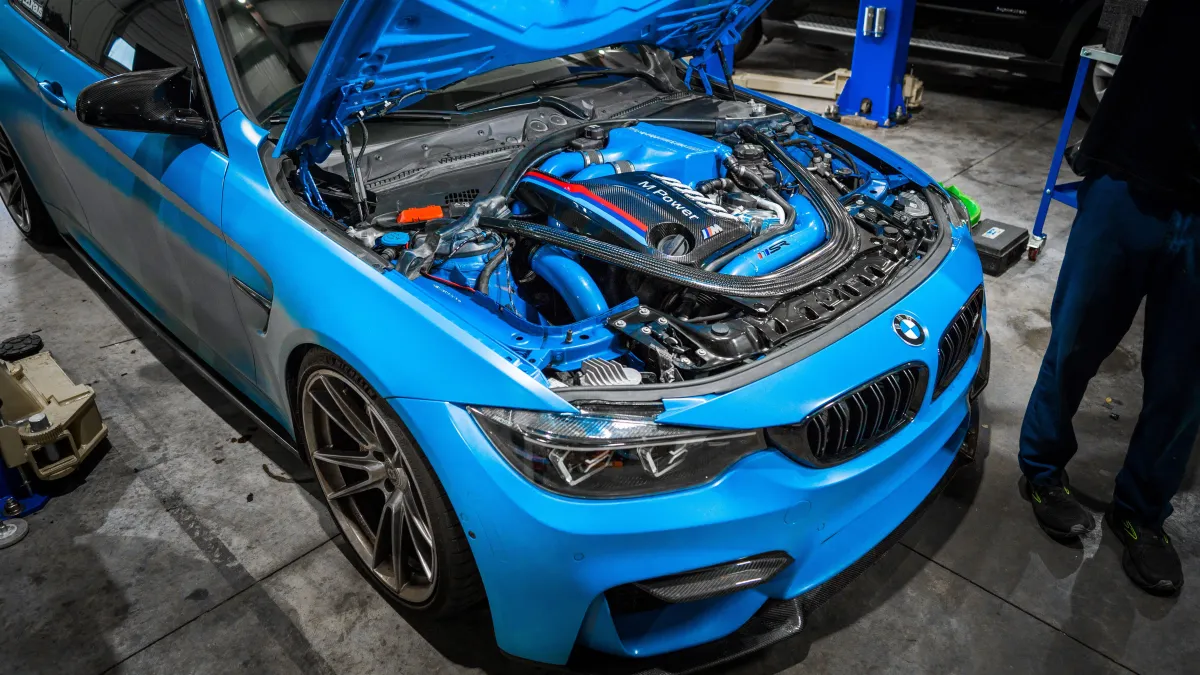
The Ultimate Guide to ECU Tuning for European Cars
Key Takeaways
ECU Tuning Enhances Performance by Optimizing Engine Parameters.
It Can Improve Fuel Efficiency and Increase Horsepower.
Tuning Must Be Done Carefully to Avoid Potential Engine Damage.
Professional Tuning Services Are Recommended for Best Results.
European Cars Often Require Specialized Knowledge for Effective Tuning.
Recently, ECU tuning has emerged as a pivotal method for enhancing the performance of European vehicles. This process involves reprogramming the car's Engine Control Unit , which is responsible for managing critical functions such as fuel injection and ignition timing. By optimizing these settings, drivers can enjoy ECU tuning benefits, such as faster throttle response, improved fuel efficiency, and increased horsepower. For modern turbocharged European cars, ECU tuning can result in significant horsepower gains, ranging from 40 to over 100 additional horsepower.

What Is ECU Tuning and How Does It Work?
ECU tuning is a process that involves modifying the software of a vehicle's Engine Control Unit to enhance performance. This modification can lead to increased horsepower and torque, offering a more dynamic driving experience. However, messing with the tuning, it's crucial to ensure your vehicle condition is excellent. Any existing issues, such as worn components, could be exacerbated by the increased demands of tuning, making a thorough inspection a crucial first step.
The process of ECU tuning requires precision and expertise, as incorrect settings can increase the engine damage risk. This risk underscores the importance of choosing a reputable professional for the task. Despite the allure of improved performance, there are reasons not to tune your car. Concerns about voiding warranties and the potential for drivetrain damage sometimes deter car owners from pursuing this modification.

Performance Gains by Make: BMW, Audi, Porsche & More
ECU tuning is one of the most powerful ways to unlock hidden performance in your European vehicle. From sharper throttle response to increased horsepower and torque, a well-executed tune can completely transform how your car drives. But not all gains are created equal—each make responds differently depending on its engine platform, factory tune, and supporting hardware.
Here’s what you can expect by brand:
BMW
BMW’s turbocharged engines—like the B58 (found in the M240i and 340i) or the S55 (in the M3/M4)—are known for responding exceptionally well to tuning. Gains of 50–100+ horsepower are achievable with a stage 1 ECU tune, especially when combined with bolt-ons like an intake, downpipe, or intercooler. Even naturally aspirated models benefit from sharper throttle response and improved drivability.
Audi
Audi’s TFSI engines, particularly in S and RS models, are highly tunable. A stock Audi S4, for example, can see gains of 60–80 horsepower with just an ECU remap. Many tunes also improve DSG/Tiptronic shifting behavior, boost response, and remove factory limitations like torque caps in lower gears.
Porsche
Modern Porsches—especially the turbocharged 911 and Macan/Cayenne models—can unlock serious power with ECU tuning. Gains of 70–100+ horsepower are possible depending on the platform. Porsche owners also love tuning for smoother power delivery, better throttle mapping, and improved low-end torque—without sacrificing drivability.
Volkswagen
VW’s GTI, Golf R, and other MQB-platform vehicles respond well to tuning, often gaining 30–70 horsepower from a stage 1 flash. These cars are a tuner’s dream: reliable, accessible, and easily upgradeable.
Mercedes-Benz
AMG engines are already impressive from the factory, but tuning can take them to another level. Turbocharged models like the C43 or E63 S can gain 80–120 horsepower, along with significant torque increases and improved launch control dynamics.
No matter the make, ECU tuning offers real, usable performance gains—especially when paired with a shop that understands how to do it safely and correctly. At SPEEDhaus 405, we tune with purpose, using dyno-proven maps and a deep understanding of each platform's unique characteristics.
What About Exotics? Tuning Supercars and High-End European Machines
If you're driving a Ferrari, Lamborghini, McLaren, or another high-end European exotic, ECU tuning can unlock eye-watering performance gains—but it needs to be done with expert care and precision.
Ferrari
Modern Ferraris, especially turbocharged models like the 488 or F8 Tributo, respond well to tuning. Gains of 80–120 horsepower are common with a proper ECU remap, along with improved throttle response and midrange torque. Naturally aspirated models benefit more from throttle mapping and driving dynamics tweaks than raw horsepower.
Lamborghini
With shared platforms like the Huracán (5.2L V10) and Audi R8, tuning can improve responsiveness and shift behavior—but naturally aspirated Lambos see modest power gains. However, if you add bolt-ons (e.g., exhaust, intake), tuning helps extract every bit of performance and gives you sharper control.
McLaren
Twin-turbo McLarens (540C, 570S, 720S) are highly tunable, with stage 1 tunes offering 80–150 horsepower gains, depending on the model. Tuning also unlocks smoother power delivery and can raise factory-imposed limits on torque or top speed.
Aston Martin, Bentley, and Maserati
These luxury-performance hybrids often run detuned versions of engines from other platforms (like AMG). ECU tuning can deliver surprising gains, improve shift behavior, and tailor throttle sensitivity for a more aggressive feel—especially in heavy touring models like the Continental GT.
At SPEEDhaus 405, we're not just focused on performance—we’re focused on precision, safety, and preserving the drivability and value of your exotic. That means using dyno-tested maps, making supporting mods where needed, and tuning each car as if it were our own.
Risks, Rewards, and Myths of Engine Remapping
ECU tuning—or engine remapping—is one of the most effective ways to boost performance, but it’s often surrounded by confusion. Between exaggerated claims and tuning horror stories, it can be hard to know what’s real and what’s just online noise. Let’s break it down.
The Rewards: Why Tuning Is So Popular
When done right, ECU tuning delivers real, measurable benefits:
Increased horsepower and torque
Sharper throttle response and drivability
Improved fuel efficiency (in some cases)
Customizable power delivery based on your driving style
A well-mapped tune optimizes fuel curves, ignition timing, boost pressure, and more—unleashing the potential your car already has but isn’t using from the factory. For many drivers, the transformation is immediate and thrilling.
The Risks: What You Need to Watch For
Tuning isn’t without potential downsides—especially when done by the wrong hands:
Engine stress from poorly calibrated boost or timing
Overheating or detonation on stock cooling systems
Transmission wear if torque limits are ignored
Warranty concerns (some tunes may void factory coverage)
The biggest risk? Generic or “off-the-shelf” tunes from unknown sources. These often push your engine too far or ignore key safety parameters. That’s why SPEEDhaus 405 uses platform-specific, dyno-tested maps that balance performance with reliability.
The Myths: What Tuning Doesn’t Do
Let’s clear up a few common misconceptions:
“Tuning ruins your car.”
Not true—if done right, it can extend drivability and efficiency. Problems arise from poor execution, not the process itself.“You’ll always get better gas mileage.”
Sometimes, yes—especially with torque-boosted tunes that reduce throttle input. But if you drive harder, you’ll naturally burn more fuel.“All tunes are the same.”
Definitely not. Two tunes for the same car can produce wildly different results depending on who wrote the map, how it was tested, and whether it accounts for your specific setup.
Bottom Line: Tuning Is Powerful—When Done Right
Engine remapping is a tool—not a toy. With the right shop, the right tune, and the right supporting mods, it can elevate your car’s performance without sacrificing safety or reliability. At SPEEDhaus 405, that’s the only way we do it.
Choosing a Trusted Shop for Safe, Effective ECU Tunes
ECU tuning can transform your car—but only if it's done by the right hands. A poorly executed tune can cause engine damage, transmission issues, or worse. That’s why choosing the right shop is just as important as the tune itself.
At SPEEDhaus 405, we specialize in safe, high-performance tuning for European vehicles. Here's what sets us apart:
Platform-Specific Expertise
We don’t take a one-size-fits-all approach. Whether you're tuning a BMW M-series, Audi S/RS, Porsche 911, or a VW GTI, we use maps tailored to your exact engine platform and driving goals.
Dyno-Tested, Proven Tunes
Our tunes are built and tested on the dyno—not just pulled from a database. That means you get reliable gains with power curves that make sense on the street and the track.
OEM-Level Tools and Diagnostics
Tuning isn’t just about adding power—it’s about knowing how far you can go safely. Our factory-grade diagnostics help us monitor data like boost, knock, AFR, and transmission behavior so we can tune with precision, not guesswork.
Transparency and Support
We’ll walk you through every part of the process—from what your tune includes, to how it affects your warranty, to what supporting mods are (or aren’t) needed. And if you ever have questions after your tune, we’re here to help—not ghost you.
Unlock Real Performance—The Right Way
Ready to feel what your European car was really built to do?
Schedule a tuning consultation with SPEEDhaus 405 today and get the power, precision, and peace of mind you’ve been looking for.
Frequently Asked Questions
What is ECU tuning?
ECU tuning involves modifying the software of a car's engine control unit to enhance performance, efficiency, or both.Is ECU tuning safe for European cars?
When performed by a professional, ECU tuning is generally safe and can improve a vehicle's performance without compromising its reliability.Can ECU tuning improve fuel efficiency?
Yes, ECU tuning can optimize engine parameters to improve fuel efficiency, although results may vary based on driving habits and conditions.Does ECU tuning void the car's warranty?
ECU tuning can void the manufacturer's warranty, so it's essential to check the terms of your warranty before proceeding.

